‘No amnesty!’: Brazilian protests demand jail for rioters
RIO DE JANEIRO — “No amnesty! No amnesty! No amnesty!”
The chant reverberated off the walls of the jam-packed hall at the University of Sao Paulo’s law college on Monday afternoon. Within hours, it was the rallying cry for thousands of Brazilians who streamed into the streets of Rio de Janeiro and Sao Paulo, penned on protest posters and banners.
The words are a demand for retribution against the supporters of former President Jair Bolsonaro who stormed Brazil’s capital Sunday, and those who enabled the rampage.
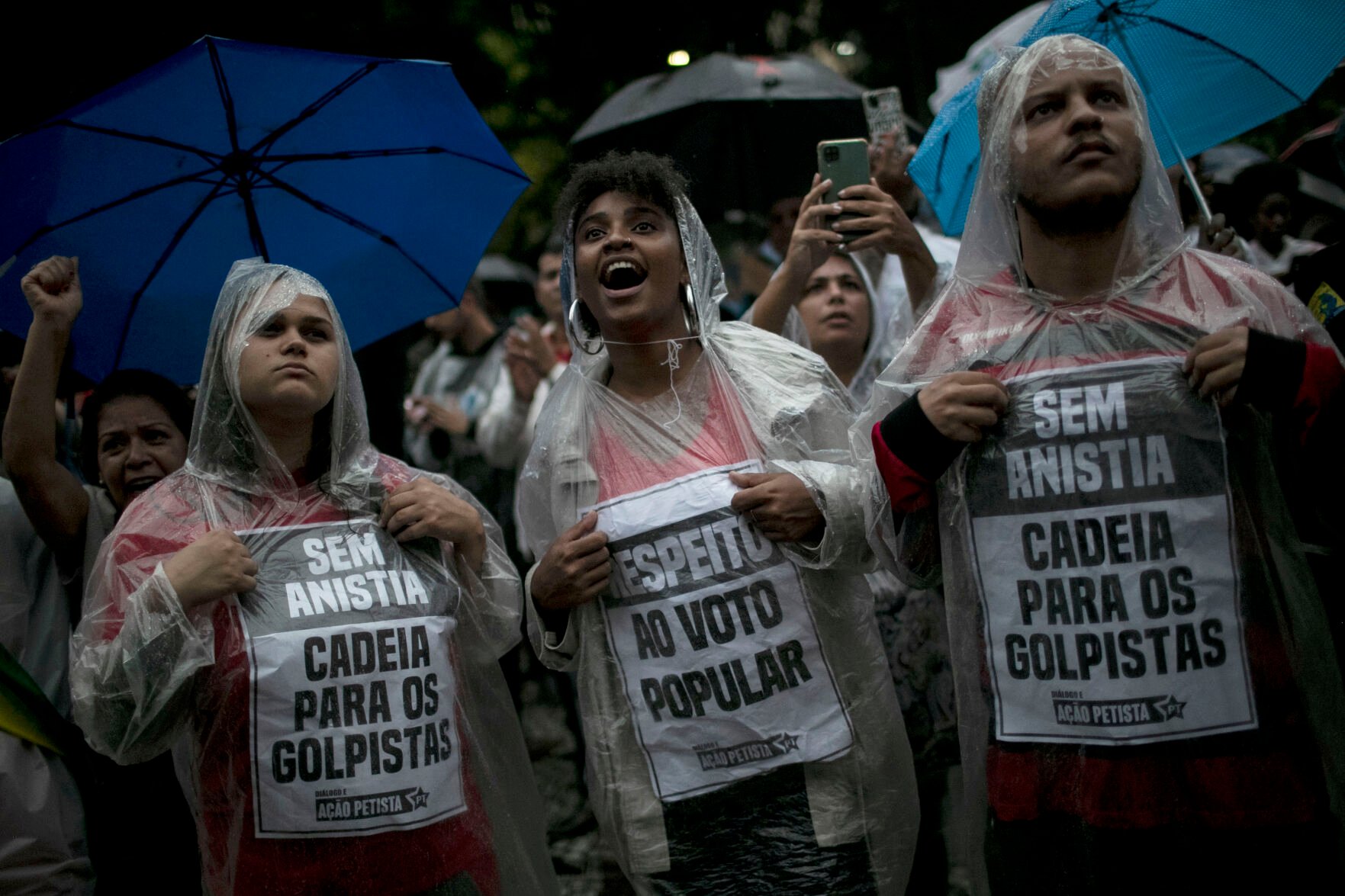
Bruna Prado, Associated Press
People hold signs that read in Portuguese "Without amnesty. Jail for coup plotters" and "Respect the popular vote" during a demonstration in favor of Brazilian democracy Monday in Rio de Janeiro, Brazil, one day after supporters of former President Jair Bolsonaro stormed government buildings in the capital city, Brasilia.
“These people need to be punished, the people who ordered it need to be punished, those who gave money for it need to be punished,” Bety Amin, a 61-year-old therapist, said on Sao Paulo’s main boulevard. The word “DEMOCRACY” stretched across the back of her shirt. “They don’t represent Brazil. We represent Brazil.”
Protesters’ push for accountability evokes memories of an amnesty law that for decades has protected military members accused of abuse and murder during the country’s 1964-85 dictatorship. A 2014 truth commission report sparked debate over how Brazil has grappled with the regime’s legacy.
Declining to mete out punishment “can avoid tensions at the moment, but perpetuates instability,” Luis Felipe Miguel, a professor of political science at the University of Brasilia, wrote in a column entitled “No Amnesty” published Monday evening. “That is the lesson we should have learned from the end of the military dictatorship, when Brazil opted not to punish the regime’s killers and torturers.”
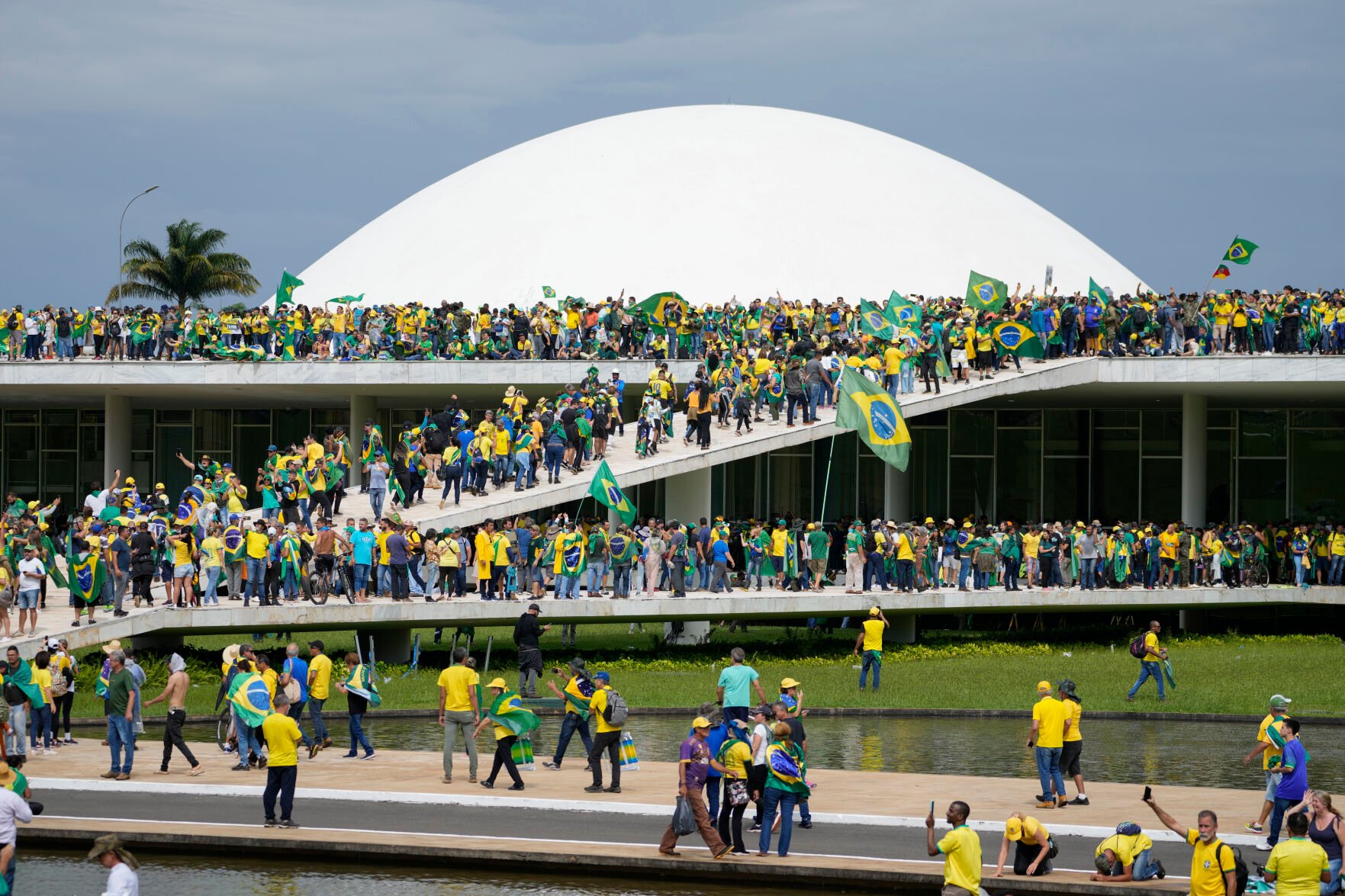
Eraldo Peres, Associated Press
Supporters of Brazil's former President Jair Bolsonaro storm the National Congress building on Sunday in Brasilia, Brazil.
Brazilian police on Monday rounded up roughly 1,500 rioters. Some were caught in the act of trashing Brazil’s Congress, Supreme Court and presidential palace. Most were detained the following morning at an encampment in Brasilia. Many were held in a gymnasium throughout the day, and video shared on pro-Bolsonaro social media channels showed some complaining about poor treatment in the crowded space.
Almost 600 who were elderly, sick, homeless or mothers with their children were released Tuesday after being questioned and having their phones inspected, the Federal Police said in a statement. Its media office previously told The Associated Press the force plans to indict at least 1,000 people. As of Tuesday afternoon, 527 people had been transferred to either a detention center or prison.
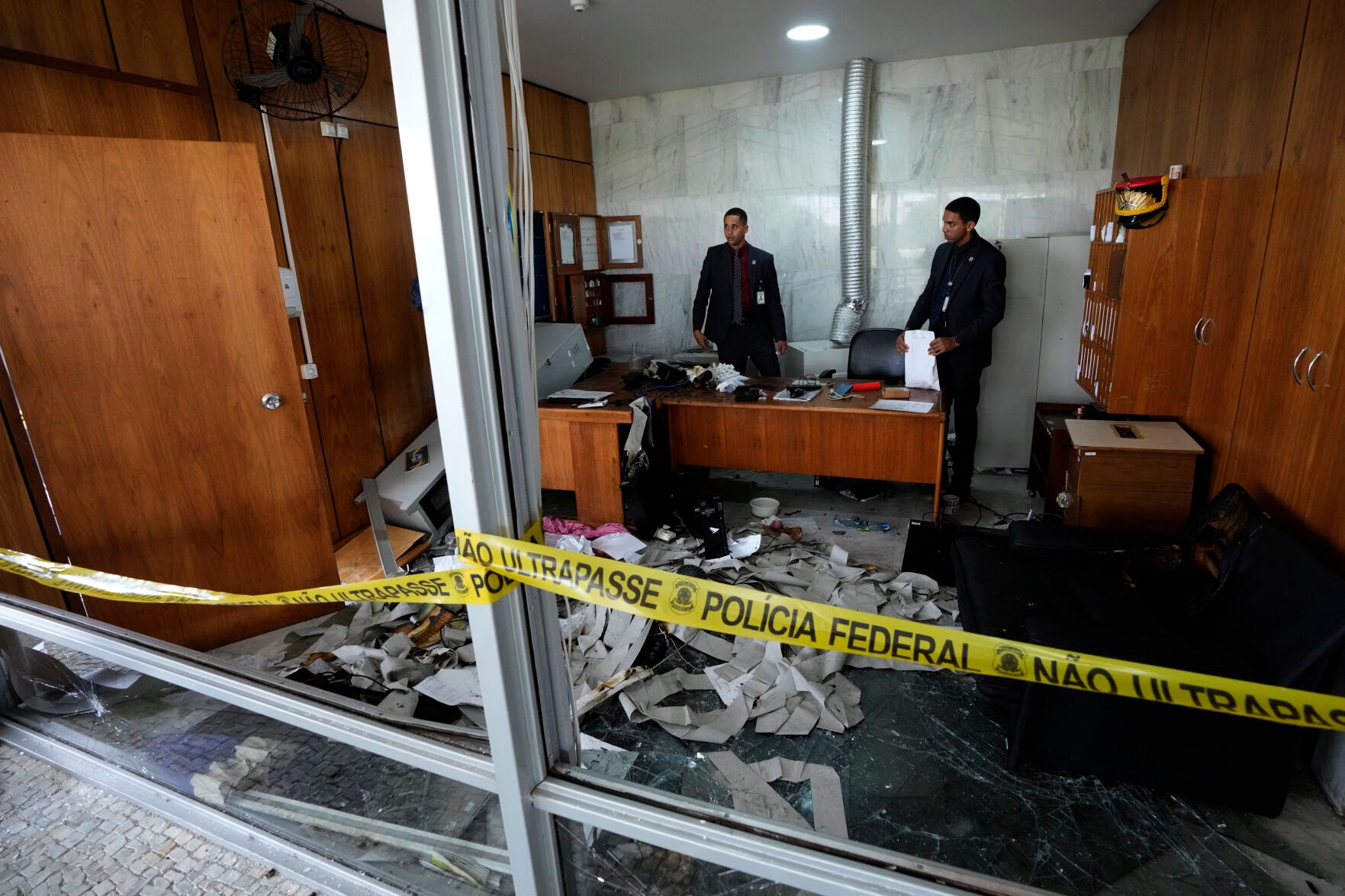
Eraldo Peres, Associated Press
Agents inspect a security room that was trashed inside Planalto Palace, the office of the president, on Monday — the day after it was stormed by supporters of Brazil's former President Jair Bolsonaro — in Brasilia, Brazil.
The administration of President Luiz Inácio Lula da Silva said jailing the rioters is only the start.
Justice minister Flávio Dino vowed to prosecute those who acted behind the scenes to summon supporters on social media and finance their transport on charges involving organized crime, staging a coup and violent abolition of the democratic rule of law. Authorities also are investigating allegations that local security personnel allowed the destruction to proceed unabated.
“We cannot and will not compromise in fulfilling our legal duties,” Dino said. “This fulfillment is essential so such events do not repeat themselves.”
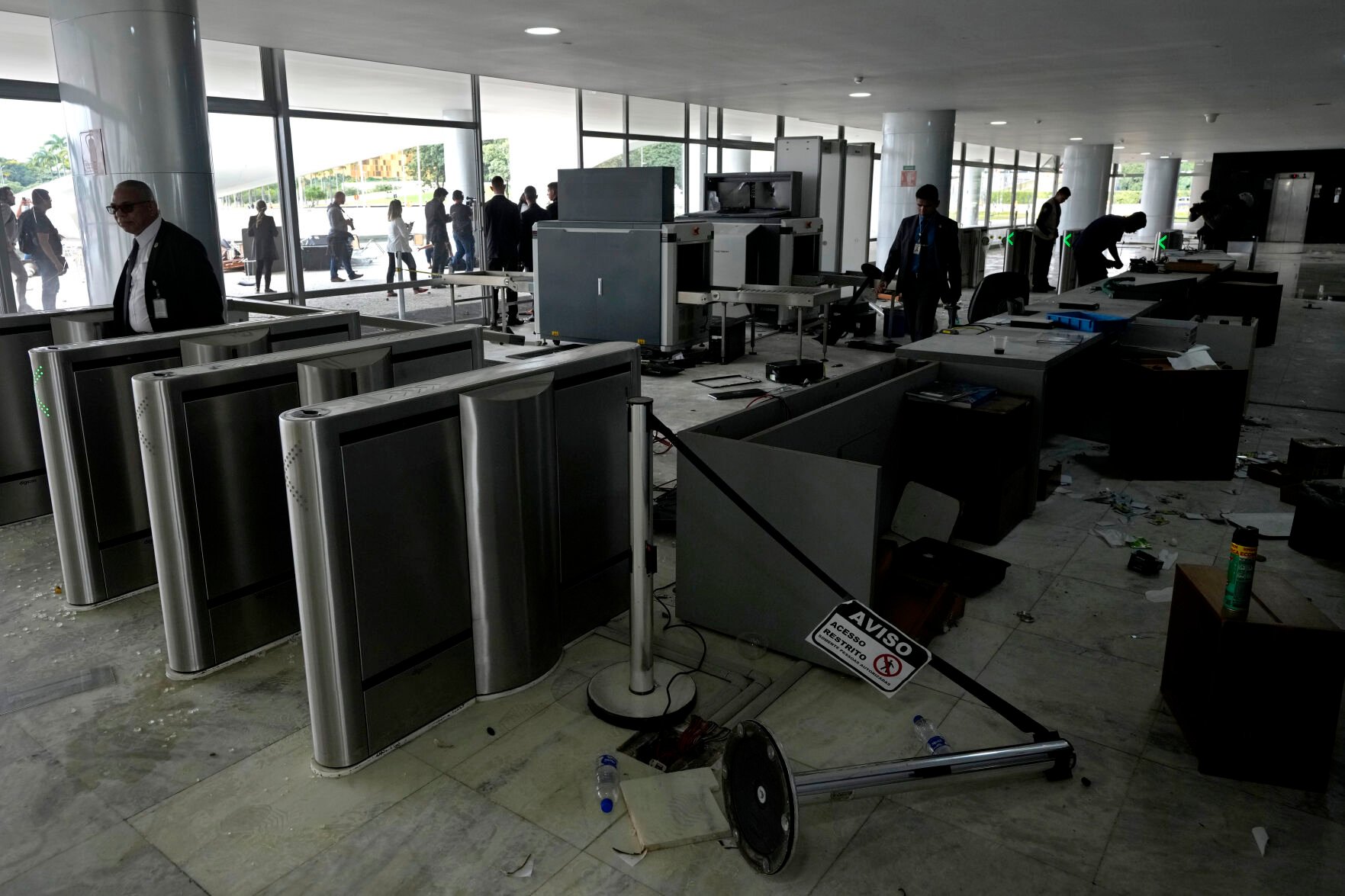
Eraldo Peres, Associated Press
Workers inspect destroyed computers in the main entrance of Planalto Palace, the office of the president, on Monday — the day after it was stormed by supporters of Brazil's former President Jair Bolsonaro — in Brasilia, Brazil.
Lula signed a decree, now approved by both houses of Congress, ordering the federal government to assume control of security in the capital.
Far-right elements have refused to accept Bolsonaro’s electoral defeat. Since his Oct. 30 loss, they camped outside military barracks in Brasilia, pleading for intervention to allow Bolsonaro to remain in power. When no coup materialized, they rose up themselves.
Decked out in the green and yellow of the national flag, they broke windows, toppled furniture and hurled computers and printers to the ground. They punched holes in a massive Emiliano Di Cavalcanti painting at the presidential palace and destroyed other works of art. They overturned the U-shaped table where Supreme Court justices convene, ripped a door off one justice’s office and vandalized a statue outside the court. Hours passed before police expelled the mob.
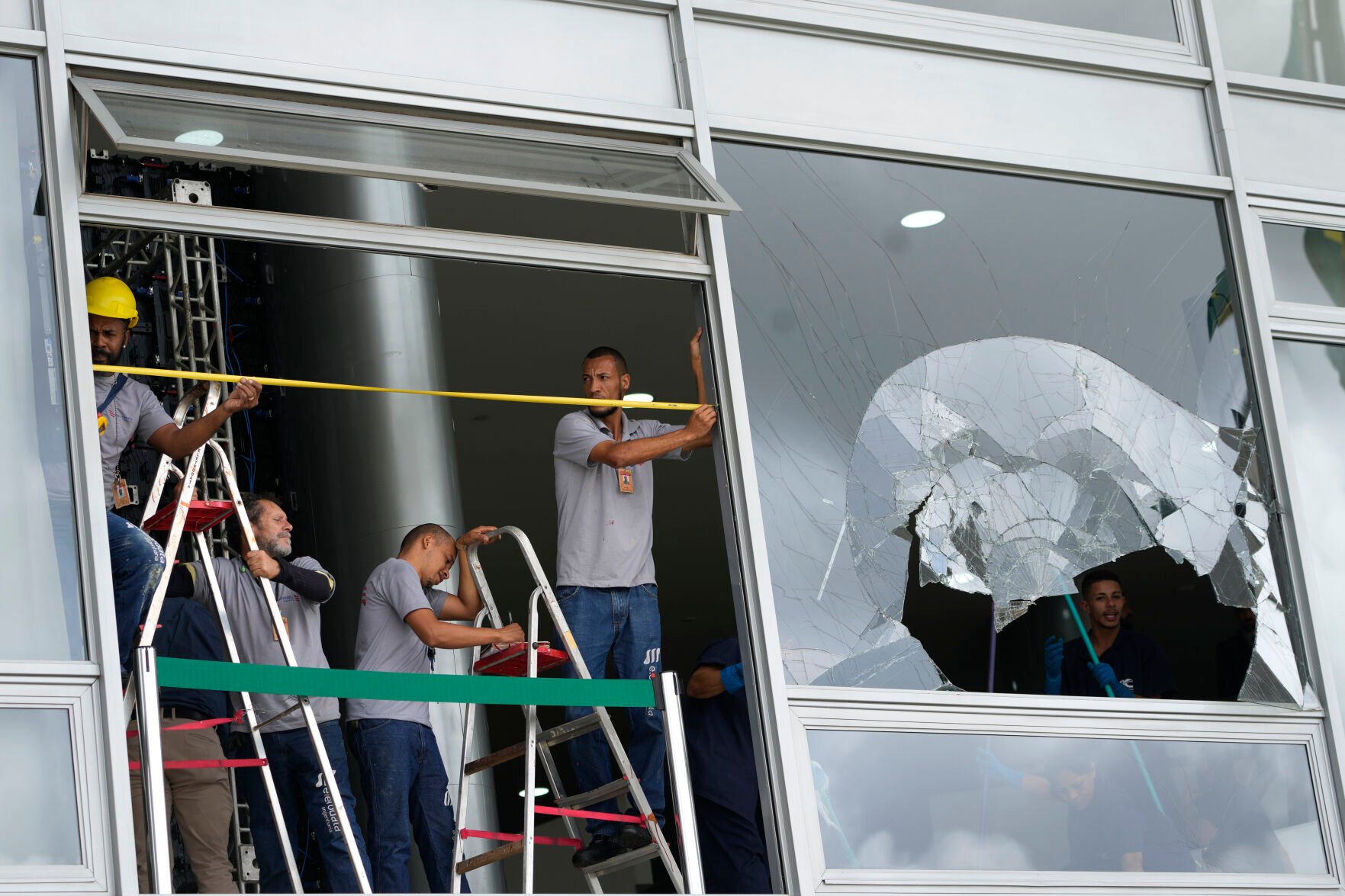
Eraldo Peres, Associated Press
Workers measure the windows of Planalto Palace, the office of the president, on Monday — the day after it was stormed by supporters of Brazil's former President Jair Bolsonaro — in Brasilia, Brazil.
Political analysts repeatedly warned that Bolsonaro was laying the groundwork for an insurrection in the mold of that which unfolded in the U.S. Capitol on Jan. 6, 2021. For months, he stoked belief among hardcore supporters that the nation’s electronic voting system was prone to fraud — though he never presented any evidence and independent experts disagreed.
Results from the election, the closest since Brazil’s return to democracy, were quickly recognized by politicians across the spectrum, including some Bolsonaro allies, as well as dozens of other governments. The outgoing president promptly faded from view, neither conceding defeat nor emphatically crying fraud. He and his party submitted a request to nullify millions of votes, which was swiftly dismissed by the electoral authority.
In the immediate aftermath of the riot, Lula said the so-called “fascist fanatics” and their financial backers must be held responsible. He also accused Bolsonaro of encouraging the uprising.
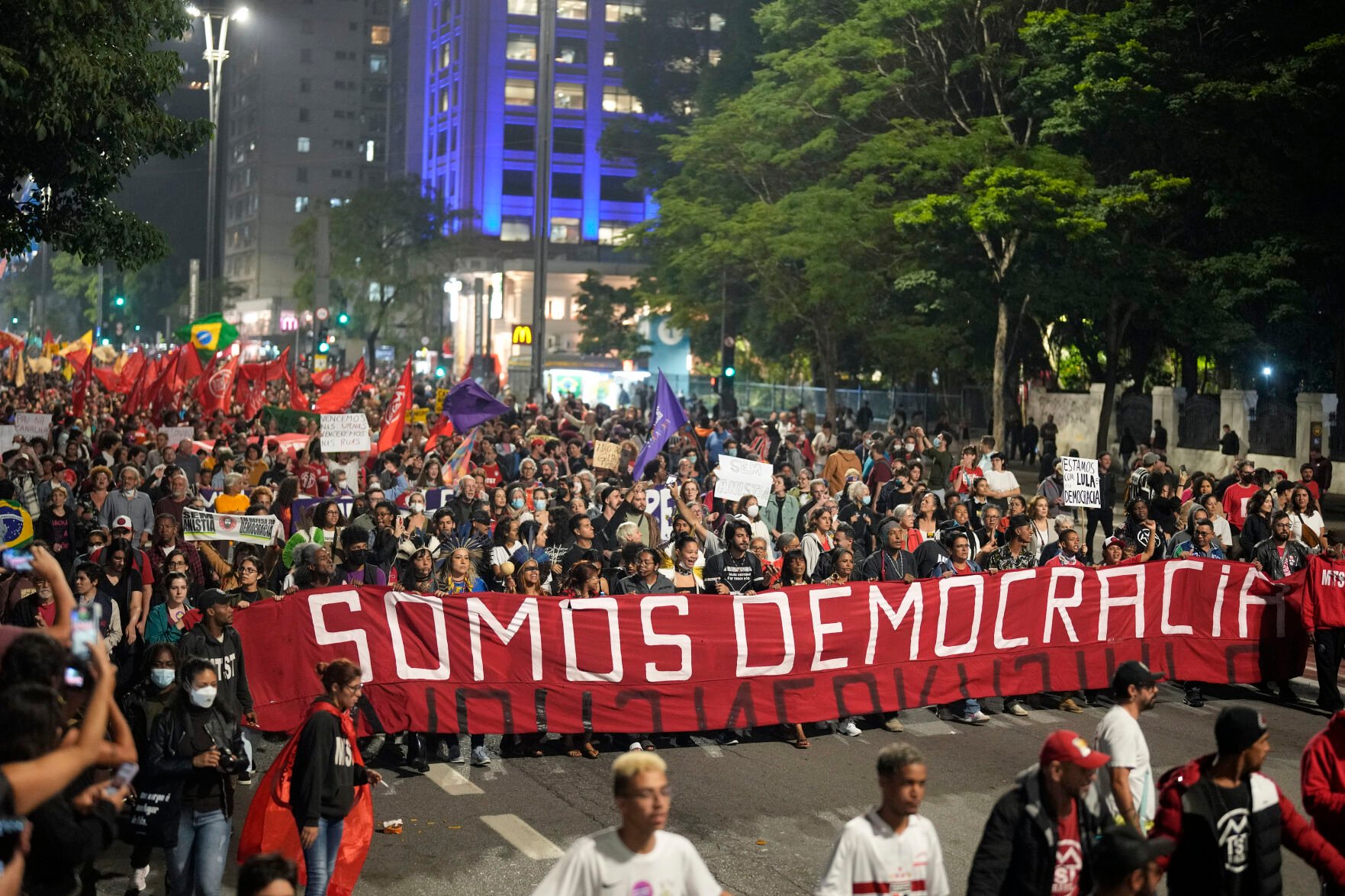
Andre Penner, Associated Press
Demonstrators march holding a banner that reads in Portuguese "We are Democracy" during a protest calling for protection of the nation's democracy Monday in Sao Paulo, Brazil, a day after supporters of former President Jair Bolsonaro stormed government buildings in the capital, Brasilia.
“It’s unacceptable what happened yesterday. It’s terrorism,” Marcelo Menezes, a 59-year-old police officer from northeastern Pernambuco state, said at a protest in Sao Paulo. “I’m here in defense of democracy, I’m here in defense of the people.”
